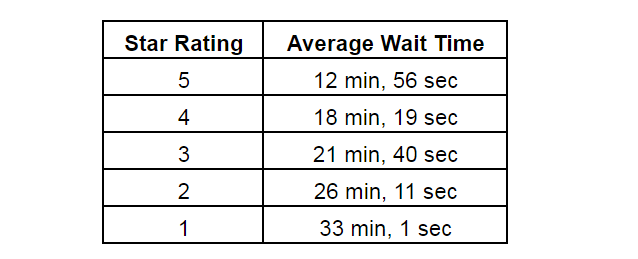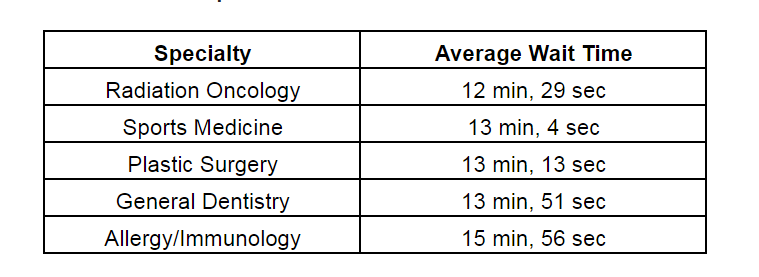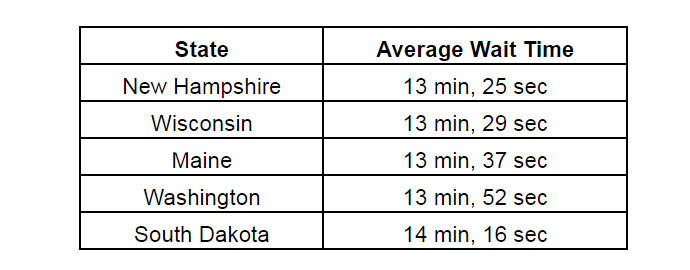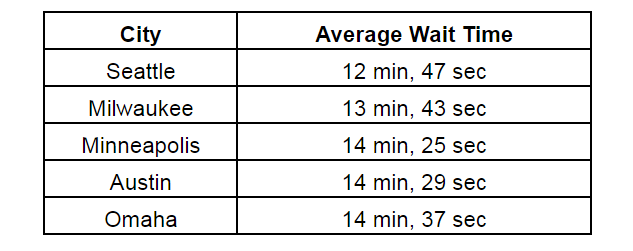
When it comes to waiting for a doctor’s appointment, most patients are waiting 19 minutes, 19 seconds – which is just good enough to keep patients happy with their service, according to Vitals 7th annual wait time report. The report finds positive reviews start to skew negative after patients are left waiting more than 20 minutes revealing the important correlation between wait time and patient satisfaction. For instance, 49 percent of patients who had a 15-minute wait rated their doctor positively. Yet, only 27 percent of patients who waited for 45 minutes ultimately left a positive physician review.
For the report, Vitals studied over 6 million reviews left by patients for doctors to see how wait times correlate to star ratings and discovered that doctors with five-stars, the highest doctor rating on Vitals, had a 13-minute wait on average. In contrast, doctors with a 1-star, the lowest rating, averaged a 33-minute wait.
Patient Wait Time Effect on Doctor Rating

Deeper analysis of reviews mentioning wait time revealed negative sentiments began even before the appointment with patients complaining about being kept on hold or not being able to get through to the office. Some also groused about not being able to get into the office for weeks – or even months. Negative doctor-patient experiences were also common with long wait times. Patients were more likely to complain of “rude” doctors or “wrong” diagnosis or prescriptions, leading many to succinctly conclude: “Don’t waste your time or money.”
In contrast, patients mentioning wait times in positive ratings were likely to “highly recommend” the doctor. The doctors were often labeled “friendly,” “kind” and “caring.” In fact, it seems temperament can trump time. Patients said an extended wait was “worth it” for a doctor who was “thorough” and “took time to listen” and “didn’t rush” during appointments.
“As a doctor, it’s critical to be skilled, but it’s also important to treat patients well,” said Mitch Rothschild, Founder and Chairman of Vitals. “What our analysis tells us is that wait time is an important factor in the patient experience and doctors who manage the clock effectively build better doctor-patient relationships.”
Rothschild added, “Undoubtedly macro-dynamics impacting health delivery today – including the rise of urgent care facilities – has driven the 10% reduction in wait time. While we are uncertain how significantly wait times can be reduced from here, we are certain that these trends and other new forces that make patients shoppers of health services, will continue to create an environment where providers are challenged to deliver higher-quality care every visit, every day.”
Specialist Wait Times
Just as opinions vary, so do specialists. Vitals found large variations in wait time depending on the doctor’s specialty. Radiation oncologists (12 minutes, 29 seconds) and sports medicine specialists (13 minutes, 4 seconds), had the shortest wait times out of the 139 types of specialists Vitals analyzed. Spine surgeons had the longest wait times, averaging 29 minutes, 34 seconds.
Doctor Specialties with the Shortest Wait Time

Regional Wait Times
Location matters, too. Out of the 50 largest cities across the U.S., Seattle had the shortest average wait time at 12 minutes, 47 seconds. Milwaukee, Minneapolis, Austin and Omaha were also in the top five. For the fifth year in a row, El Paso had the highest reported wait time at 25 minutes, 5 seconds, on average. Miami, Memphis, Las Vegas and Detroit were also among the cities with the highest average wait time
Cities with the Shortest Wait Times

New Hampshire defended its position as the state with the shortest wait time at 13 minutes, 25 seconds. Wisconsin, Maine, Washington and South Dakota also had short wait times across their states. For a second year, Alabama was ranked at the bottom of the states, averaging 21 minutes, 1 second. Mississippi, West Virginia, Arizona and Nevada were also in the bottom five.
States With the Shortest Wait Times

Vitals’ annual Physician Wait Time Report, now in its seventh year, was compiled from patient-reported wait times in 2015.
Featured image credit: Jason Park via cc
